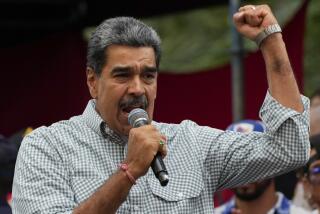Sandinista Regime Accused of Arresting, Harassing Nicaraguans at U.S. Embassy
- Share via
WASHINGTON — Nicaraguan security police last week arrested 14 Nicaraguan citizens employed by the U.S. Embassy in Managua, accused them of working for the CIA and subjected them to “psychological abuse (and) unacceptable harassment,” the State Department said Tuesday.
Department spokesman Charles Redman denied that any of the 14 were engaged in espionage, and he accused Nicaragua of attempting to intimidate the embassy employees. Redman disclosed the arrests, carried out between Nov. 2 and Nov. 7, shortly after the U.S. government delivered a strongly worded protest note to the Nicaraguan Embassy in Washington.
Speech by Ortega
In a related development, Redman said that Nicaraguan President Daniel Ortega, in a speech Monday night, placed conditions on the Contadora peace process that “appear designed to make agreement difficult, if not impossible.”
The incidents involving embassy employees appeared to place new strains on relations between Washington and Nicaragua’s leftist Sandinista government. The State Department’s decision to make the matter public apparently was intended to ease the pressure on the employees or, perhaps, to preempt a Nicaraguan propaganda offensive accusing them of spying.
Redman said the U.S. government will do its “utmost to ensure (the employees) are protected to the best of our ability.”
Redman said the embassy employees work as drivers and clerks and at other support jobs. The U.S. government hires citizens of the host country for such tasks throughout the world, including the Soviet Union and other Communist states. Up to 60 Nicaraguan nationals are full-time employees of the embassy.
Reading from a prepared statement, Redman said the 14 employees were “subjected to long periods of intense and often abusive interrogation, ranging from six to 13 hours in length.”
He added: “All have been subjected as well to psychological abuse, by being forced to sit for extended periods of time in small, windowless rooms; by being allowed to sit or speak only at the whim of the interrogator, and by being forced to walk at all times with their heads down and eyes on the ground, accompanied by armed guards.
“All have been accused of working for the CIA, and all have been told they were ‘prisoners.’ So far, all have been released, but with warnings that they will be under surveillance in the future.”
None Have Resigned
He said none of the 14 employees have resigned.
Asked if the accusations included specific acts of spying or were limited to general charges of working for the CIA, Redman said: “I can’t get into the specifics of the accusations. . . . It is largely an attempt at intimidation.”
One Administration official said later that the employees were questioned about their duties and their access to sensitive information. The arrests appeared to be intended to make it more difficult for the U.S. government to operate in Managua, this official said.
He added that Nicaraguan security guards stationed outside the embassy building in recent weeks have sought to harass and intimidate Nicaraguans seeking to enter the embassy to obtain visas or for other purposes.
In his speech Monday in Managua, Ortega rejected the latest peace proposal for Central America put forward by Mexico, Panama, Colombia and Venezuela, the four nations involved in the Contadora peace talks.
Assistance to Contras
He said the plan, still in draft form, is unacceptable because it does not prohibit U.S. military maneuvers in the region and does not prevent U.S. assistance to anti-Sandinista rebels, known as contras.
Redman said that President Reagan, in his recent speech to the U.N. General Assembly, had said that U.S. support for the contras “cannot and will not cease” unless the Nicaraguan government agrees to negotiate with the insurgents.
“Nicaragua demands that its internal insurgency be resolved prior to signature (of a peace plan), but it rejects every offer by the resistance for dialogue,” Redman said. He added that the Sandinistas’ refusal to talk to the contras is “the real obstacle to peace.”
“We hope Contadora is not dead,” Redman said. “The pre-conditions that Nicaragua has established, however, appear designed to make agreement difficult, if not impossible. It has for some time appeared that the Sandinistas were trying to frustrate the completion of a workable Contadora treaty, and this most recent demand continues their intransigence.”
More to Read
Sign up for Essential California
The most important California stories and recommendations in your inbox every morning.
You may occasionally receive promotional content from the Los Angeles Times.













